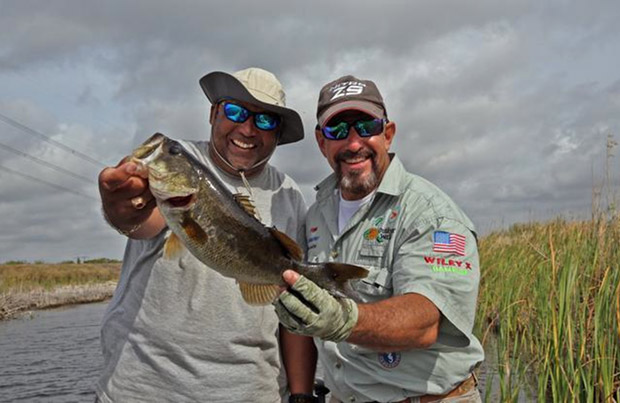
The two fishermen set up the fishing rods, crack a few jokes and talk about strategy — “When you feel him tug that line a couple times, point your rod right at him and hit him, hit him good.” They begin casting, looking for bass and anything else that might bite.
The trip is one of many that Neal Stark, 52, takes with military veterans out on the water, allowing nature to serve as a form of recreational therapy for those returning home from war.
Stark, a hairdresser for decades and competitive angler, got the idea for his organization, Fishing with America’s Finest, when he volunteered to take a soldier fishing in 2009 and noticed how therapeutic the experience was for him. The program eventually spread through word of mouth and now has an active Facebook page and social-media community.
“I realized that it was something I could do to make a difference,” Stark says.
His fishing buddy on this trip is Rudy Watt, 52, a former first sergeant and 21-year U.S. Army veteran who was diagnosed in 2004 with post-traumatic stress disorder.
Watt is a tall man with a big build, wearing dark shades, camouflage shorts and a gray T-shirt. His arms are adorned with tattoos — one arm pays tribute to his extreme scuba-diving group, the other to his years of service in places like Bosnia, El Salvador, Germany and Iraq. A native of Kingston, Jamaica, Watt said that being out on the water has been the biggest factor in keeping him active.
“There is a certain excitement there when you hook a fish and bring them in, but just being on the water is the magic,” Watt says.
Stark says he forms bonds with all of the veterans he works with but has become closer to Watt over the multiple trips they’ve taken. The free program also partners with the Veterans Administration and the Wounded Warrior program. Stark says he appreciates being able to give back and make “fishing friends” with the veterans.
“We have a lot in common, in the sense that we both have a love for the outdoors,” Stark said. “It’s not just the fishing thing for me. Rudy is my friend, and he’ll be a friend forever.”
The relationship between the two men started last August when they had their first fishing trip and became the subjects of a documentary titled Rudy and Neal Go Fishing. The film’s director and producer, Abigail Sharon, said that she knew about Stark’s program and wanted to tell a story that would help people understand the struggles and treatment of PTSD.
“It’s sort of hard to relate to if you haven’t had a personal experience,” Sharon said. “We hope that [the film] exposes that you don’t have to do things in the traditional way.”
She and her crew started a Kickstarter campaign in March to raise funds for the film’s post-production and have since reached their goal. They hope the film will be ready to be entered in festivals in May.
Although they’ve been on multiple trips together, Stark continues to teach. He stops to correct certain techniques and offers tips on the fly with each cast of the fishing rod. After catching a fair amount of bass, the two break out celebratory cigars and continue making their way through the water.
Read more here: http://www.miamiherald.com/2014/04/12/4054401/fishing-buddies-find-healing-on.html#storylink=cpy



